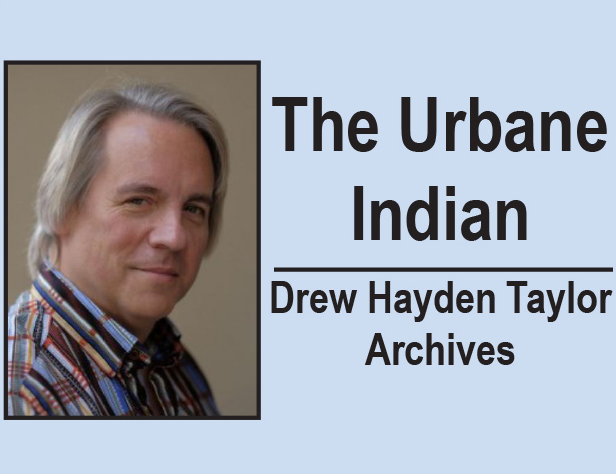
By Drew Hayden Taylor
Originally published in August 2011
Everybody dislikes something. Actually, most people dislike a lot of things. Welcome to human nature.
Still, it’s a little disconcerting when that dislike is aimed directly at you. Being a writer with a bit of a public profile, I am familiar with criticism. Sometimes though, it can puzzle and perturb you.
Several months ago I had a speaking engagement in the First Nations community of Alderville in southern Ontario where I talked about Native humor and how it is often cutting, politically incorrect, and self-deprecatory.
It’s a type of survival humor. I know this because I once edited and compiled a book exploring and deconstructing Native humor called “Me Funny”, and I included about 70 Indian jokes that it took me a year to compile from far flung friends to illustrate that humor.
So I like to say I wrote the book on Native humor. Again, we as Native people tend to make fun of ourselves a lot, and teasing seems to be a dominant factor.
And as part of my presentation, I told some of these jokes that had been sent to me from all over Turtle Island (North America for those without their First Nations/Canadian dictionary). There is this one joke that was given to me by a Native woman in Nanaimo. It is long but it’s about a woman who has 10 children, all of whom are named Lloyd. A friend asks her how she can separate all her kids if they have the same name, to which the mother replies “Oh, I call them by their last name.” The implication is clear.
I have told this joke about two or three hundred times, in Native communities or gatherings all over North America, usually with a good belly laugh and a look of delighted shock. And as with most humor, the joke is hardly an accurate representation of actual Aboriginal life. It is an exaggeration of a situation to a ludicrous extent.
Oddly enough, after telling that joke for about five years to, I assume, tens of thousands of people, I was informed some time later that several people at this gathering in Alderville found the joke offensive. I was strongly urged to retire the joke and never speak it again.
As a social and cultural humourist, I am no stranger to people not particularly accepting some of the things I have to say or how I say them. So I was not offended. If anything, I find it fascinating how sometimes people struggle to silence the storyteller because they don’t like the story.
Remember, a few months ago, there was a controversy over a 20-year-old song. Somebody in Canada had lodged a complaint regarding the song “Money For Nothing” by Dire Straits because it had the word ‘faggot’ in it.
Completely bizarre.
Yes, it is an offensive term, but if this person had listened to the song and acknowledged the ironic way it was being used in the context of the song, they would have smiled instead of trying to ban the song.
On a more controversial note, the recent reissue of Huckleberry Finn. A publisher, in order to make it less controversial and perhaps more teachable, has removed the “N” word from a black character’s name, and I believe replaced it with “slave.” This is a move that makes me, as well as many other artists uncomfortable. That’s messing with a masterpiece.
Back to my original argument. I disagree with a lot of things I may read and hear, but I don’t try and put an end to them. Recently I was asked if I would provide an afterward to a new issuing of Brian Moore’s novel Blackrobe. I remember reading it when it first came out and not liking it or its portrayal of Native people.
In discussion, I said I would love to provide an afterward, but I warned them, it would quite probably be a critical one. They opted not to include me. I did not try and ban the book.
Over the years I’ve been told my play Toronto At Dreamer’s Rock is racist against white people. An Elder from Edmonton, after viewing a movie I wrote based on my play In A World Created By A Drunken God wanted it banned and destroyed.
I’ve had people object to the title of my touring play Only Drunks And Children Tell The Truth and cancel the play’s appearance in their town.
Over the years I’ve learned to just smile. To me it’s like getting a bad beef stroganoff in a restaurant. You may not like it but I don’t think you’d tell the chef to stop cooking or to throw out their cookbook.
And people wonder why I drink.
